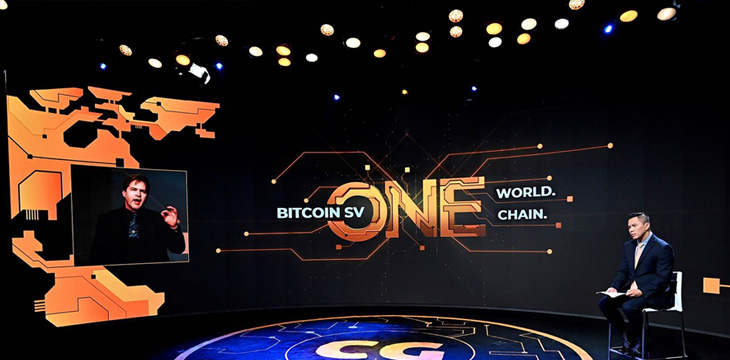|
Getting your Trinity Audio player ready...
|
In 1933, newly inaugurated President Franklin D. Roosevelt began doing periodic “fireside chats” wherein he would take an informal tone with the nation to discuss things that were on his mind. This was an era of great shift, and FDR was a polarizing figure of the progressive movement, so the President felt that it was important for him to address the country directly so that he could clarify his thoughts, perhaps teach a little lesson, but mostly just let the beleaguered nation hear his voice to let them know that he was riding out the storm with them.
The Atlantic called the FDR fireside chats, “[a] revolutionary experiment with a nascent media platform,” which is a fitting comparison to the final segment of day two at CoinGeek LIVE.
Dr. Craig Wright appeared live from London to answer questions and close the day with the challenge to “be strong,” which is a message that resonates extra hard as we think back to years of the Bitcoin Civil War, the victory lap around the Genesis protocol, and the long crawl up the mountain that we have taken together with the Bitcoin experiment.

This fireside chat was a few parts history, and a few parts future. All of it inspiring! But that’s getting a little ahead of things.
Blockchain or a timestamp server?
Jimmy opened up with a question about the word “blockchain,” asking where the concept of the timestamp server came from as it was referenced in the white paper.
Wright elucidated an anecdote about the history of auditing, and the notion that once something had been checked multiple times and verified by trusted parties, that it should be solidified (or hashed) so that it does not ever have to be re-accounted again. Even if a change was to be made, a new timestamp would be created with reference to the previous one so that nothing could be erased, and everything could be verified forever. In Wright’s mind, this feature of Bitcoin would liberate us to focus on the present and the future because the past could no longer be tampered with!
The next problem to solve in Bitcoin was the elimination of the fallibility of trusted parties by a process of competitive proof of work—the cornerstone of Bitcoin. Wright also discussed the double-spending problem starting with bad checks, but being solved by honest nodes and importance of chronological transaction ordering. Most of all, the answer was (is) simplicity. As Wright said in the interview, “simple wins” in regards to the bitcoin protocol as well as anything built atop it.
He continued with a reiteration of what was said on Day 1 about the importance of distilling down terabytes of data into a single hash as a foundational principle which enables SPV, and other aspects of bitcoin’s innate ability to scale on chain. With a chronological timestamp server, the hash can be accounted for cryptographically and by time, which is a crucial metric for sorting.
Malware alert?
Upon Jimmy’s question, Wright mentioned that his first idea for Bitcoin-inspired thinking was as a sort of alert system in the detection of malware. “A canary system,” which would record the alerts across a number of nodes on the network, he said. The idea was ultimately scrapped due to a buy-out, but it sounds like something BitPing could consider resurrecting for their suite of network intelligence tools!

Craig waxed on about the beauty of hashing geolocation data to global shipments and creating an unbreakable chain of custody similar to what we saw with medical and pharmaceutical data presented today, or what UNISOT’s Seafood Chain presented at CoinGeek London. Imagine a world where the seals cannot be broken and we could know exactly the history of everything on earth! It was a simple statement with global implications on the understanding of the value of knowledge.
How does Google make money?
Not with a single click! But with the aggregation of data that comes from a worldwide volume of clicks. Dr. Wright wrapped up his thoughts by pointing out that the current model of batched data creates silos, but that bitcoin monetizing each individual byte of data allows a much more valuable world to grow out of the ashes of this terrible Bitcoin Civil War (my words, not his.)
And so we return to his challenge to “stay strong.” Thinking back to the BCH trolls during the hash war, or perhaps Hodlnaut or Peter McCormack on on Twitter, or any number of battles he has fought for bitcoin since 2008. Craig wears the wounds of this war on his sleeve, but he took the closing moments of his fireside chat to let us know a few key points about our adversaries in this battle:
“There are a lot of bullies, but bullies are cowards.”
“The best thing you can do is show them that you’re better.”
“They seem important. They’re not.”
His challenge to us all was to ignore the noise, the criticisms and the doubt. Instead, he wants us all to build something great! Motivating words from a motivated man speaking at the end of a day that was filled with inspiring entrepreneurs who didn’t waste their day on Twitter, but instead are pitching or displaying their work to turn Bitcoin into the backbone of the emerging, global data economy.
Watch CoinGeek Live Day 2 here.

 12-29-2025
12-29-2025 




